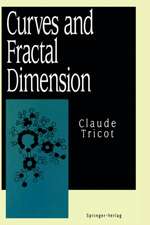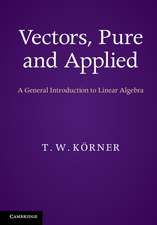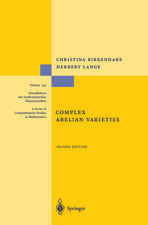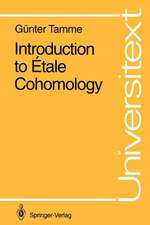Introduction to Singularities
Autor Shihoko Ishiien Limba Engleză Hardback – 2 dec 2014
It is said that algebraic geometry originated in the seventeenth century with the famous workDiscours de la méthode pour bien conduire sa raison, et chercher la vérité dans les sciencesby Descartes. In that book he introduced coordinates to the study of geometry. After its publication, research on algebraic varieties developed steadily. Many beautiful results emerged in mathematicians’ works. Most of them were about non-singular varieties. Singularities were considered “bad” objects that interfered with knowledge of the structure of an algebraic variety. In the past three decades, however, it has become clear that singularities are necessary for us to have a good description of the framework of varieties. For example, it is impossible to formulate minimal model theory for higher-dimensional cases without singularities. Another example is that the moduli spaces of varieties have natural compactification, the boundaries of which correspond to singular varieties. A remarkable fact is that the study of singularities is developing and people are beginning to see that singularities are interesting and can be handled by human beings. This book is a handy introduction to singularities for anyone interested in singularities. The focus is on an isolated singularity in an algebraic variety. After preparation of varieties, sheaves, and homological algebra, some known results about 2-dim
ensional isolated singularities are introduced. Then a classification of higher-dimensional isolated singularities is shown according to plurigenera and the behavior of singularities under a deformation is studied.
| Toate formatele și edițiile | Preț | Express |
|---|---|---|
| Paperback (2) | 451.87 lei 6-8 săpt. | |
| Springer – 25 dec 2018 | 451.87 lei 6-8 săpt. | |
| Springer – 23 aug 2016 | 484.08 lei 6-8 săpt. | |
| Hardback (2) | 375.76 lei 38-44 zile | |
| Springer – 2 dec 2014 | 375.76 lei 38-44 zile | |
| Springer – 2 oct 2018 | 587.85 lei 6-8 săpt. |
Preț: 375.76 lei
Nou
Puncte Express: 564
Preț estimativ în valută:
71.90€ • 75.07$ • 59.51£
71.90€ • 75.07$ • 59.51£
Carte tipărită la comandă
Livrare economică 01-07 aprilie
Preluare comenzi: 021 569.72.76
Specificații
ISBN-13: 9784431550808
ISBN-10: 4431550801
Pagini: 232
Dimensiuni: 155 x 235 x 20 mm
Greutate: 0.5 kg
Ediția:2014
Editura: Springer
Colecția Springer
Locul publicării:Tokyo, Japan
ISBN-10: 4431550801
Pagini: 232
Dimensiuni: 155 x 235 x 20 mm
Greutate: 0.5 kg
Ediția:2014
Editura: Springer
Colecția Springer
Locul publicării:Tokyo, Japan
Public țintă
GraduateCuprins
0.
Preliminaries:
Variations
of
making
singularities0.1.
By
cutting–hypersurface
singularities,
hyperplane
section
of
singularities0.2.
By
taking
quotients–quotient
singularities,
quotient
of
singularities0.3.
By
lifting
up–covering
singularities0.4.
By
contractions
1.
Sheaves,
algebraic
varieties
and
analytic
spaces1.1.
Preliminaries
on
sheaves1.2.
Sheaves
on
a
topological
space1.3.
Analytic
space
and
Algebraic
variety1.4.
Coherent
sheaves2.
Homological
algebra
and
duality2.1.
Injective
resolutions2.2.
i-th
derived
functors2.3.
Ext2.4.
Cohomologies
with
the
coefficients
on
sheaves2.5.
Derived
functors
and
duality2.6.
Spectral
sequence3.
Singularities,
algebraization
and
resolutions
of
singularities3.1.
Definition
of
a
singularity3.2.
Algebraization
theorem3.3.
Blowups
and
resolutions
of
the
singularities3.4.
Toric
resolutions
of
the
singularities4.
Divisors
on
a
variety
and
the
corresponding
sheaves4.1.
Locally
free
sheaves,
invertible
sheaves
and
divisorial
sheaves4.2.
Divisors4.3.
The
canonical
sheaves
and
a
canonical
divisor4.4.
Intersections
of
divisors5.
Differential
forms
around
the
singularities5.1.
Ramification
formula5.2.
Canonical
singularities,
terminal
singularities
and
rational
singularities6.
Two
dimensional
singularities6.1.
Resolutions
of
two-dimensional
singularities6.2.
The
fundamental
cycle6.3.
Rational
singularities6.4.
Quitient
singularities6.5.
Rational
double
points6.6.
Elliptic
singularities6.7.
Two-dimensional
Du
Bois
singularities6.8.
Classification
of
two-dimensional
singularities
by
κ7.
Higher
dimensional
singularities7.1.
Mixed
Hodge
structures
and
Du
Bois
singularities7.2.
Minimal
model
problem7.3.
Higher
dimensional
canonical
singularities
and
terminal
singularities7.4.
Higher
dimensional
1-Gorenstein
singularities8.
Deformations
of
singularities8.1.
Change
of
properties
under
deformations8.2.
Versal
deformationsAppendix:
Recent
resultsReferences
Recenzii
“This
book
presents
some
results
of
the
study
of
singularities
within
the
field
of
algebraic
geometry.
…
The
text
is
clear
and
well
written
and
it
is
accessible
to
non-expert
readers.
…
the
author
defines
all
the
concepts
and
the
results
are
either
proved
or
a
reference
is
provided.
This
makes
the
book
self-contained
in
a
broad
sense.
It
is
a
useful
volume
both
for
readers
studying
singular
varieties
for
the
first
time
and
for
experts
on
classification
of
singularities.”
(Santiago
Encinas,
Mathematical
Reviews,
August,
2015)
Textul de pe ultima copertă
This
book
is
an
introduction
to
singularities
for
graduate
students
and
researchers.
It is said that algebraic geometry originated in the seventeenth century with the famous workDiscours de la méthode pour bien conduire sa raison, et chercher la vérité dans les sciencesby Descartes. In that book he introduced coordinates to the study of geometry. After its publication, research on algebraic varieties developed steadily. Many beautiful results emerged in mathematicians’ works. Most of them were about non-singular varieties. Singularities were considered “bad” objects that interfered with knowledge of the structure of an algebraic variety. In the past three decades, however, it has become clear that singularities are necessary for us to have a good description of the framework of varieties. For example, it is impossible to formulate minimal model theory for higher-dimensional cases without singularities. Another example is that the moduli spaces of varieties have natural compactification, the boundaries of which correspond to singular varieties. A remarkable fact is that the study of singularities is developing and people are beginning to see that singularities are interesting and can be handled by human beings. This book is a handy introduction to singularities for anyone interested in singularities. The focus is on an isolated singularity in an algebraic variety. After preparation of varieties, sheaves, and homological algebra, some known results about 2-dim
ensional isolated singularities are introduced. Then a classification of higher-dimensional isolated singularities is shown according to plurigenera and the behavior of singularities under a deformation is studied.
It is said that algebraic geometry originated in the seventeenth century with the famous workDiscours de la méthode pour bien conduire sa raison, et chercher la vérité dans les sciencesby Descartes. In that book he introduced coordinates to the study of geometry. After its publication, research on algebraic varieties developed steadily. Many beautiful results emerged in mathematicians’ works. Most of them were about non-singular varieties. Singularities were considered “bad” objects that interfered with knowledge of the structure of an algebraic variety. In the past three decades, however, it has become clear that singularities are necessary for us to have a good description of the framework of varieties. For example, it is impossible to formulate minimal model theory for higher-dimensional cases without singularities. Another example is that the moduli spaces of varieties have natural compactification, the boundaries of which correspond to singular varieties. A remarkable fact is that the study of singularities is developing and people are beginning to see that singularities are interesting and can be handled by human beings. This book is a handy introduction to singularities for anyone interested in singularities. The focus is on an isolated singularity in an algebraic variety. After preparation of varieties, sheaves, and homological algebra, some known results about 2-dim
ensional isolated singularities are introduced. Then a classification of higher-dimensional isolated singularities is shown according to plurigenera and the behavior of singularities under a deformation is studied.
Caracteristici
Is
a
unique
book
that
combines
birational
geometry,
traditional
local
aspects
of
singularities,
and
new
developments
in
research
on
singularities
Shows the origin of recent dramatic developments in research on Du Bois singularities
Introduces and explains the Toric method as a useful way to calculate examples and makes use of mixed Hodge structures to classify singularities
Shows the origin of recent dramatic developments in research on Du Bois singularities
Introduces and explains the Toric method as a useful way to calculate examples and makes use of mixed Hodge structures to classify singularities
Notă biografică
Shihoko Ishii is a professor emeritus at the University of Tokyo and a professor at the Tokyo Woman's Christian University.















